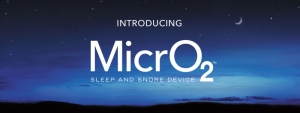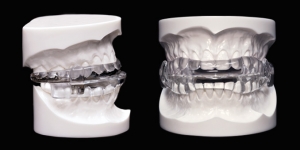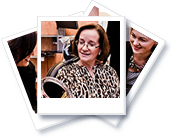If you snore or have been diagnosed with sleep apnea, it’s important to seek treatment at once. When left untreated, sleep apnea can increase your risk of serious health issues such as heart disease, stroke, and diabetes.
Dr. Frank DePaola is always looking for new treatments that will provide his patients with the relief they need. He has recently added the MicrO2™ sleep and snore device to his extensive array of sleep apnea treatments. The MicrO2™ device can help keep your airway open while you sleep so that you wake up more rested and with the energy you need to enjoy your day.
The best way to find out whether the MicrO2™ device is right for you is to speak with Dr. Frank in person. Please call 201-792-9400 today to schedule a sleep apnea consultation at our Hoboken dental office.
What is Sleep Apnea?
Sleep apnea is a potentially serious sleep disorder. There are two forms of this condition, obstructive sleep apnea, and central sleep apnea. The first is the most common. Fortunately, it’s also the easier of the two to manage. Obstructive sleep apnea happens when the soft tissue around the airway collapses upon the full relaxation that occurs when you sleep. This closure of the airway begins with narrowing which causes loud snoring. When the airway closes, snoring stops. It stops because breathing has stopped. In response to the lack of oxygen and rapid decline in heart rate, the body is jolted by adrenaline. You might never fully wake from this jolt, but your body may jerk and you may make a choking or gasping noise.
I Snore. Do I have Sleep Apnea?
Snoring and sleep apnea do go together. However, snoring is not enough of an indicator to prove that you have this sleep disorder. If you snore but don’t have pauses in your snoring sounds and you don’t make the other noises associated with apnea episodes, chances are you simply snore. If you question whether or not you may have sleep apnea or you are a serious snorer, meaning that you disrupt your sleeping partner or others who sleep in close proximity to you, we recommend coming into the office for a consultation. Snoring may not be as serious of a problem as sleep apnea, but it could still benefit from a thorough assessment and treatment recommendations.
How is Sleep Apnea Diagnosed?
First, your doctor or dentist will ask you about your symptoms. In addition to loud snoring followed by a pause and choking or gasping, the following are indicators of sleep apnea:
- Restless sleep
- Waking frequently during the night
- Dry mouth or sore throat when you wake up
- Daytime sleepiness or chronic fatigue
- Difficulty concentrating
- Irritability, anxiety, or depression
- Night sweats
- Frequent headaches
- Sexual dysfunction
- Waking often during the night to urinate
Your dentist or doctor won’t just evaluate your symptoms. To accurately diagnose sleep apnea, it’s also necessary to perform a sleep study. This test monitors your breathing, sounds, and other vital signs while you sleep. The results of your test may be the best possible guide to identifying the ideal treatment for you.
Must I Get Professional Treatment for Sleep Apnea?
Your health depends on getting quality sleep. If snoring or sleep apnea is an obstacle to this, we want to help you! That said, you may benefit from trying other approaches to resolving your snoring problem. Suggestions include:
- Avoid sleeping aids and alcohol before bed. While you want to get a good night’s sleep, the use of alcohol or sleeping pills can create the ideal scenario for so much bodily relaxation that the muscles around your airway become restrictive.
- Lose weight. We understand how frustrating it can be to be told that weight loss is a solution to yet another problem. If you’re obese, you have more soft tissue around your throat, and hence your airway. Losing weight can ultimately eliminate the excess fatty tissue that is collapsing your airway while you sleep. This remedy takes time, so in the interim it would be wise to seek clinical treatment.
- Change your sleeping position or pillow. Sleep apnea often occurs when a person sleeps on their back. If this is your go-to sleep position, it may help to sleep on a wedge pillow or try sleeping on your side.
- Consider your sinuses. If you have chronic sinus problems or allergies, one condition could be causing the other. To see if sinus congestion and inflammation is contributing to sleep apnea, take a decongestant or other approved medication as directed.
What is the MicrO2™ Sleep and Snore Device?
Many patients find common sleep apnea treatment options such as CPAP and sleep devices uncomfortable, resulting in poor compliance with the treatment. How effective can these treatments be if patients don’t wear them consistently? The MicrO2™ offers you a solution to this problem.
The MicrO2™ is designed to be the smallest and most comfortable custom-made jaw advancement device available for the treatment of sleep apnea. It’s easy to use and easy to care for, eliminating many of the hassles associated with CPAP and other sleep devices.
When you use the MicrO2™ device, it will hold your lower jaw in a slightly forward position that keeps your soft tissue away from the back of your throat. This opens your airway and helps eliminate snoring and sleep apnea.


Benefits of MicrO2™ Sleep and Snore Device
You will experience many benefits when you use the MicrO2™ device, including:
- Digital simplicity – MicrO2™ is the first CAD/CAM milled sleep apnea device available, offering precise and predictable results.
- Comfortable profile – MicrO2™ is made from control-cured PMMA, making it compact without compromising durability or retention.
- Easy adjustment — MicrO2™ features a one-piece construction with no moving parts, making it easy to use and easy for Dr. Frank to adjust.
- Lingual-free splint – The lingual-free design offers you maximum tongue space.
- Expert design — MicrO2™ was designed based on the clinical expertise of leaders in the field of dental sleep medicine.
To learn more about the MicrO2™ sleep and snore device, please contact the Center for Dental Sleep Medicine using the form at the right side of the page or call 201-792-9400 today to schedule your initial sleep apnea consultation. Dr. Frank DePaola serves patients in Hoboken, Jersey City, and throughout Hudson County, New Jersey.














